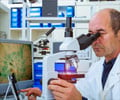A team of scientists has discovered a new way to potentially block the growth of neuroblastoma - a type of cancer behind 15 percent of all cancer deaths in kids.
A new way to potentially block the growth of neuroblastoma - a type of cancer behind 15 percent of all cancer deaths in kids has been discovered by a team of scientists.
Working with human cell lines and tissue samples, researchers explain how they were able to short-circuit genetic processes that apparently contribute to neuroblastomas - tumours that arise from the developing nervous system in children and often appear in the abdomen, chest or neck.Concentrating on a gene known as ALK, the scientists used a small-molecule inhibitor, a technique common to many drugs, to block abnormalities that apparently cause neuroblastomas.
The team, led by Dana-Farber Cancer Institute researchers Rani E. George, M.D., Ph.D., an assistant professor of paediatrics at Harvard Medical School, and A. Thomas Look, M.D., a professor of paediatrics at Harvard, analysed the ALK gene in 94 tumours representative of general neuroblastomas and 30 neuroblastoma cell lines.
They found that ALK abnormalities in a subset of neuroblastoma cells appear to interfere with the natural cell-death processes.
They also found that some of the ALK mutations were sensitive to a tiny organic molecule known as TAE684, a discovery that may be useful in efforts to create drugs to staunch cancer growth.
Besides this, the researchers used gene-transfer techniques to initiate ALK-related cancer in rodent cells. These transduced neuroblastomas also appear vulnerable to the small molecule, known as an ALK inhibitor.
Advertisement
"This research group looked at neuroblastoma in a totally different and complementary way to ours and came up with similar results, validating the role of ALK mutations. A unique aspect of their work is they proved in a model system that these mutations can indeed be cancer-causing, " Nature quoted paediatric oncologist Yael P. Mosse, M.D., of The Children's Hospital of Philadelphia, as saying.
Advertisement
Ultimately, researchers hope drug treatments can be developed to disrupt the cancer cell-signaling process.
The study is published in the online issue of Nature.
Source-ANI
RAS/S











